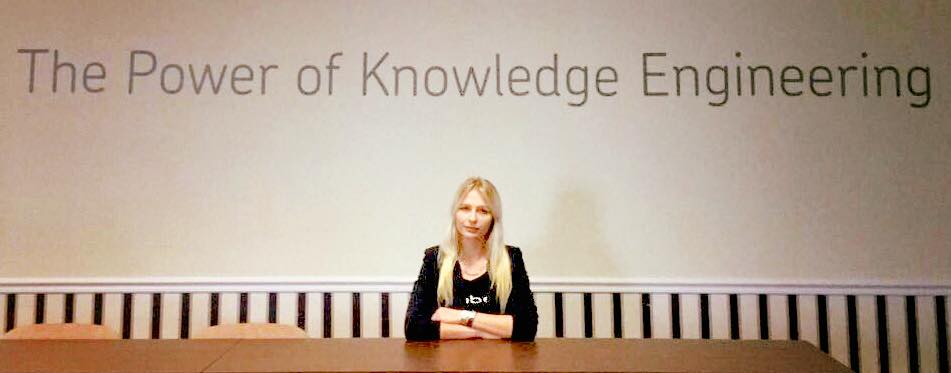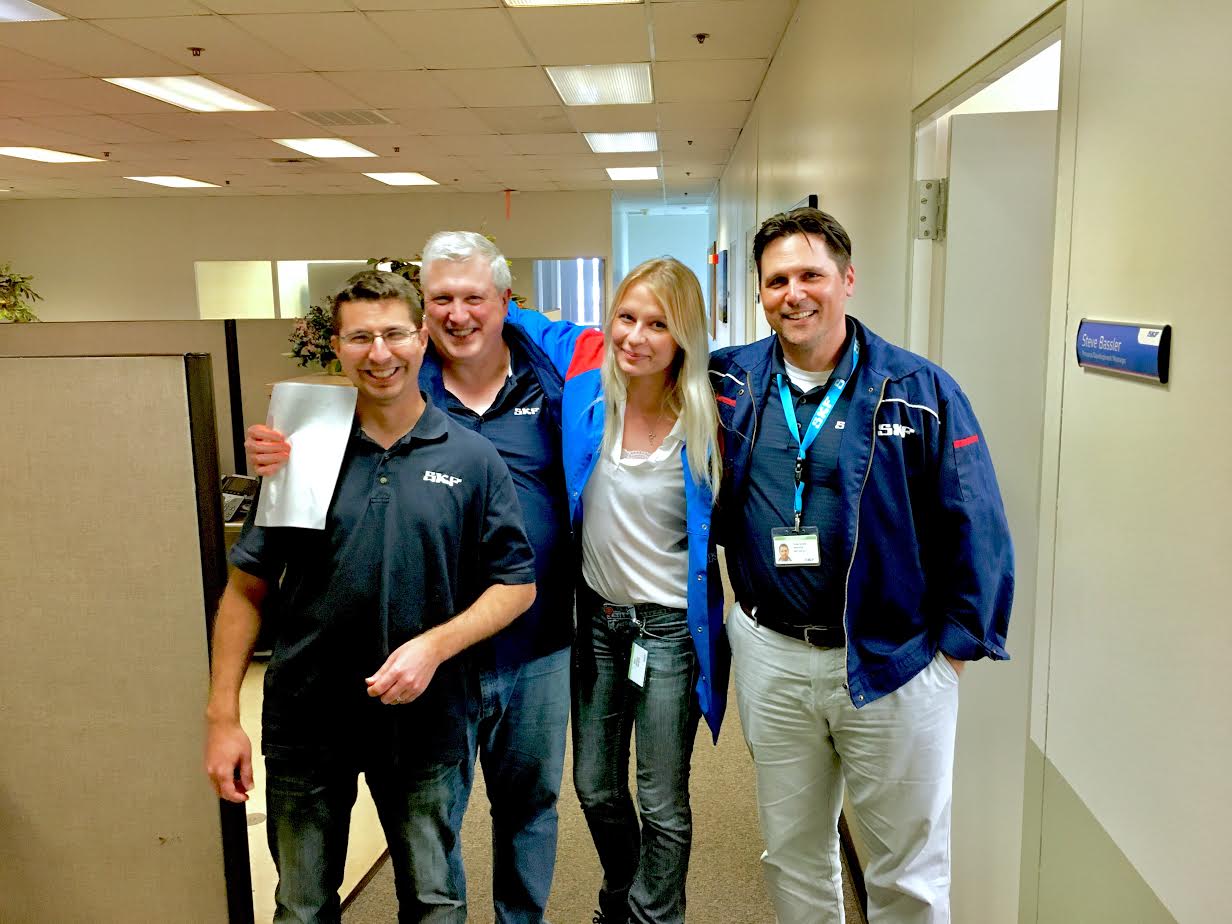Foco de atención
Conozca a Sofiya, Ingeniera Industrial y de Sistemas
 Sofiya Kukharenko is an Industrial and Systems Engineer at SKF USA, Inc., based in Georgia. She moved to the United States from Ukraine at the age of 2. From an early age, Sofiya seized every opportunity she could within the education system to become the second person in her family to graduate from an American college (after her older sister), and to achieve success in a male-dominated career.
Sofiya Kukharenko is an Industrial and Systems Engineer at SKF USA, Inc., based in Georgia. She moved to the United States from Ukraine at the age of 2. From an early age, Sofiya seized every opportunity she could within the education system to become the second person in her family to graduate from an American college (after her older sister), and to achieve success in a male-dominated career.
Sofiya graduated from the prestigious Georgia Institute of Technology which she attended on a full-ride HOPE scholarship. Georgia Tech is ranked first in the world by US News & World Report for their industrial engineering program. During college, Sofiya spent a year interning at the World Trade Organization, and also took a semester off to complete mission work in the Middle East. Outside of her work as an engineer, Sofiya is also a professional cellist and enjoys running.
Take us to your office… what does a typical day at work look like for you?
There IS no typical day for an engineer. There is always going to be something breaking, going wrong, ordered wrong, or refusing to fit. So, every day is a new problem. But that's exactly what engineering is. In all other careers, problems are obstacles to the job---but in engineering, problems ARE the job! Every morning starts off with personal time to respond to emails and do a little project management. Organization is critical in our field, and failure to communicate properly can be devastating. After we've all finished our second cup of coffee, the office is noticeably buzzing as we collaborate on various projects we've been assigned. Most of our work must be done on a computer (using Excel for data analysis, Autocad for drawings, Access for database updating, etc), but a third of the work day is spent out on the factory floor. We wear our jeans, steel-toed boots, and safety goggles, and blend in with the machines as we study them and try to find solutions to either fix them or improve them. Everyone has their own style of how they prefer to work, but at the end of the day, you have to keep in mind you're working with hundreds of other employees, both domestically and internationally, and being flexible to their work dynamics is important.

Can you give us an example of the type of projects you typically work on?
Industrial and systems engineers are concerned with solving logistical problems in order to reduce wastage and increase the efficiency of production processes. For example, one part of the 7-month long project I am currently working on at SKF is positioning machines of a particular batch operation in a maximally efficient and ergonomic order. First, I used graph theory to blindly position the machines (without knowing their purpose, only process times and utilization rates) so that the operational flow is uninterrupted in case of a deadlock scenario (eg. if a machine is down, or the channel is undermanned). This is important to help cut down cycle times and increase production (and therefore, profit...a six sigma approach to any manufacturing environment). I took the original factory channel layout, and arranged it in the software programme Autocad into the best layout, given my surface area constraints. The final stages included gathering together the team of everyone involved and having them review it from their relevant perspective: shipping, supply, health/safety, engineering, operative, maintenance, quality control, etc. Then I made any critical adjustments, and had the machines transported and rearranged according to my layout.
¿Cuál diría que es su mayor logro personal?
 A big part of it has to do with the fact that I went to Georgia Tech… and over there, the simplest way to put it, is that it was Hell. It was 4 years of struggling, and we lost so much sleep. But then finally being able to overcome that, you definitely come out stronger. And you see that all those skills they instilled in you…. the mathematics, but also those life skills, soft skills, and people skills, actually work in real life. You get to design something and it happens! You see it actually cut out, or transported on machines and put in place, and it works! That’s the best part, to see it put into use finally. It’s very rewarding!
A big part of it has to do with the fact that I went to Georgia Tech… and over there, the simplest way to put it, is that it was Hell. It was 4 years of struggling, and we lost so much sleep. But then finally being able to overcome that, you definitely come out stronger. And you see that all those skills they instilled in you…. the mathematics, but also those life skills, soft skills, and people skills, actually work in real life. You get to design something and it happens! You see it actually cut out, or transported on machines and put in place, and it works! That’s the best part, to see it put into use finally. It’s very rewarding!
Personally, I’m proud that I took the time to learn programming; mainly that I invested time in re-taking my programming class in college. I didn’t have to, since I passed the first time around, but I felt that I really wanted to learn the subject since it is so useful, and I had more to get out of the course. Don’t be afraid to retake a class… in engineering, everyone does it, even if you didn’t fail; especially do it if it’s relevant for your future! You may not get everything the first time around. The second time around you will have different professors who can offer different explanation. There is absolutely no shame in it.
In terms of working life, I like the culture of teamwork, and the “wolf-pack” mentality. A micro-managerial atmosphere is rough for an engineer, because engineering is creativity at work; it is feeling free to put your ideas on paper and then translate them into reality. The freedom to create is very important to me.
What does it really take to make it and succeed in this career?
You will not succeed if you hate what you’re doing. You don’t necessarily have to love all of your tasks, but you must enjoy some aspects. For me, I really like building databases and programming. I may not get to do that every day/week/month, but every company needs databases, and I’m good at it, so when I do get to do it, for me it’s fun; it’s not work at all. These little things keep you coming back; a genuine desire and passion to learn will also keep you up-to-date on the latest aspects of industrial engineering and keep your skills sharp so you’re always on top of your game.
How do you find a mentor in this industry?
In school, it is absolutely important to establish relationships with two teachers at least. If you can’t do that, you won’t develop the skills necessary to speak with management and to work your way up in your subsequent career. You don’t have to sit there with no purpose, but talking to your teacher may be as simple as just going to office hours and asking for some help with homework. For example, at a low point in college I asked one of my algebra teacher if I really needed to learn a certain part of the curriculum for my future career… and he said “no worries, just try to pass the class, no one uses this in real life.” Just having that advice really took a load off my shoulders. So professors really help you figure out what you should put your effort and focus into. Plus regular interaction with teachers will help a lot with recommendation letters you will need for further studies or your first job.
Mentors on the job are also very important for integrating and assimilating into a company. Someone has to explain ‘this is how we do it, this is our culture.’ In my experience at anywhere I’ve worked or any team I’ve been on, there are always people willing to help you. They may tell you ‘you may think this way because you were taught like this, but we don’t do it that way here.’ It helps you jump the learning curve and get ahead of the game a bit… you grow into a family.
Have you faced any setbacks in your career and how did you overcome them?
 Well, one issue which I dealt with more in college, because I’m with a good company now, is being a rare female in the STEM field. Today, I’ve heard that Georgia Tech has more programs to increase the percentage of women in their engineering courses, but when I was there I felt that perhaps more than my male peers, I had to earn respect.
Well, one issue which I dealt with more in college, because I’m with a good company now, is being a rare female in the STEM field. Today, I’ve heard that Georgia Tech has more programs to increase the percentage of women in their engineering courses, but when I was there I felt that perhaps more than my male peers, I had to earn respect.
I realized that sometimes even I made the same mistake! If I was sitting in lecture with a guy to one side and a girl to my other side, I found myself naturally turning to the guy when I had a question. It goes to show how ingrained these things can be for us, but being aware of it and openly addressing these preconceptions is important. I’ve learned that getting angry doesn’t really solve anything. For many people who may seem a bit biased this way, it is usually just a result of how they were raised and conditioned to think. I’m really proud of our generation for bringing more of a light to this issue and calling it out.
Even in my working life, sometimes I’ve felt like certain co-workers treat me like a secretary rather than an engineer… for example, asking me “Can you type this up for me?” Like I said, anger doesn’t help at all but I give them a firm yet polite “No.” You have to help people change. Respect in the workplace cannot be compromised and if any kind of unwarranted harassment persists after you have verbally warned an offender, you should report your case to management. I think the biggest mistake is to go in there with a bold attitude though, especially if you have less experience. That’s not going to earn you any friends. Come in with a humble attitude but never compromise your self-dignity… you will claim their respect and everything else will fall into place.
Have you faced significant competition in the industrial engineering field? How did you set yourself apart?
Most of the competition I faced was really in college. I will never forget when I got the results of my first exam back and I saw that I had gotten a 68. And I was the type of kid who had gotten nothing less than an A all through high school. It was a shock! I started asking around if anyone else in the class was struggling, and the girl next to me just kind of vaguely told me she had gotten an A or something.
Later that day, I went to my professor's office to ask him something, and I happened to see that same student’s paper on the top of a pile on his desk… she had actually scored somewhere in the 30s. That’s when I learnt that college wasn’t the same environment as high school was, it was more competitive and people tend to hold their cards closer to their chest. That’s fine as long as you can keep things in perspective and don’t feel like you’re stupid or something. It’s important to ask for help from professors when you need it, but remember your position is not unique. My mantra now is: there is always someone smarter than you! Don’t try to always be at the top, even if you were in high school, at one point in university maybe the whole class will seem smarter than you. Focus on self improvement: earn discipline, how to study better, how not to study. Cram sessions only save you about 10 percent of the time, at best.
Engineering programs are notoriously challenging. Do you have any tips on navigating a degree in engineering?
Don’t underestimate the workload of an engineering degree. If you can handle extracurricular clubs in addition to the workload, then that’s great, but don’t stress about clubs and making your resume bigger. If you don’t feel exposed enough in class, professors will give you extra projects or assignments if you ask. I did that a lot, for example my Calculus II professor asked me to do a month-long statistics report with her. Keep in mind, if all you’re doing in college is going to class and then studying on your own, you’re not doing it right.
Being organized and picking your activities carefully is key. At one point in college, I was working three jobs to help support my family and myself. But for example, one of my jobs was as a care provider for an elderly lady who lived alone, which allowed me the flexibility of studying at her house when I didn’t have any particular duties to perform.
Summer school is also a very good option. Especially if you attend a very challenging college, go to a different college in the summer and take the hardest classes of your curriculum there. I learned the most in my community college classes, because the teachers there have an education in teaching, as in they are specifically trained to teach. A professor in college may never have taken a course in teaching a class, because in many cases they are at the institution to do research. Another option if you have financial constraints when it comes to paying for your degree, is to attend a community college for the first two years of the program and then transfer into a 4-year university or college. You have to do what makes sense for you and at the end of the day you will have the same degree as your peers… it shouldn’t be a matter of pride.
Any last words of advice for our readers?
Do not do the bare minimum. Engineering may not be for you if you just want to get by with an easy job. It’s always going to be difficult, especially in the beginning, but you have to appreciate the hard work, because with hard work comes big results and so much more satisfaction.
A more practical point of advice, is to to go ahead and YouTube industrial engineers. See what it is they do and see if it’s what you want. Also, think ahead. In five years after your degree, is this career going to be in demand? For example, I have nothing against civil or architectural engineering but think about it, in five years our computers are going to be doing all our math for us... basically if you can be replaced by a computer, don’t go into that field. It used to be really big in my generation to be able to do math quickly in your head. It doesn’t matter anymore. No one’s doing calculus in their head now, everybody would rather have it checked on the computer anyway.
What matters now is if you can present results, communicate well with others and explain what you’re planning or trying to design. If you can’t communicate what’s in your mind, then you’re not going to be a very useful asset to any company. So try to develop soft skills. You’ll really get an important chance to do this in your Senior Design Project, during the final year of your undergraduate degree. A lot of people go for the big companies- the Fortune 500s- for this program, but I would say it doesn’t really matter, and in fact, you may not get as much experience there as you would with a smaller company.
FInally, start looking for a job early… it will greatly increase your chances of getting a job right after college. So, start going to interviews in your last semester, even if it is just for the experience.
Thank you so much, Sofiya, for taking the time to share such sincere advice and for motivating the aspiring engineers of the Gladeo network!




